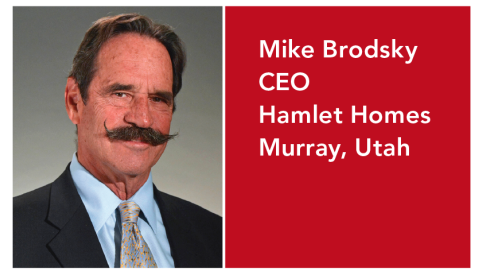Family-owned businesses abound in the home building industry. Although consolidation has absorbed a percentage of them, second-, third- and fourth-generation builders are still carrying on the family name.
Trust and respect, two key ingredients of any healthy relationship, are just as important with family members who work together, as Court Johnson will attest.
"In a family business, the relationships become much more emotionally charged on all fronts," says Court, who has run Denver-based Johnson Communities for the past seven years alongside his brother Craig. "There’s more freedom to express your feelings, which is both good news and bad news." He believes the arrangement works "partially because we started with a solid relationship and partially because there’s a real respect for the other guy’s expertise. It’s a seamless collaboration with a lot of deference."
In a 1997 study conducted by the Arthur Andersen Center for Family Business and MassMutual, top executives of more than 3,000 family-owned businesses were surveyed (14.2% were in the construction industry). In addition to the key findings represented here in chart form, 79% of respondents said the senior generation would like the business to remain in the family, but 17% were not confident about the next generation’s commitment.
Steven Thorne, a partner with Arthur Andersen and head of the firm’s family business practice in the Midwest, says one of the biggest problems with family businesses is the lack of planning and communication.
"Estate planning and succession are very emotional issues, and there’s always the potential for conflict," says Thorne.
Experts at the Arthur Andersen Center recommend that successive generations work elsewhere before they enter the family business.
"Kids just out of college tend to make a lot of mistakes, and the mistakes are viewed much more critically if it’s the owner’s kid," says Thorne. "But if they gather experience working at a different company, they tend to be more sensitive to interpersonal issues, and ultimately the succession process will go more smoothly."
| Brothers Craig (left) and Court Johnson of Johnson Communities, Denver. "We always had a vision to work together," says Craig.
|
The Johnsons: Dynamic Duo
Craig and Court Johnson have always been close -- the brothers are 48 and 47, respectively -- but they’ve had their disagreements as business partners. "In the first couple of years [after we started the company], I don’t think the people in the offices down the hall were in love with us because of the decibel level that occurred almost weekly," Craig says. "But we worked through the problems and became more secure and trusting of each other. I can’t think of the last time Court and I got into a major fight."
The brothers learned the ropes from their father, Howard, who was a CEO at Pulte Home Corp. in the mid-1970s and early ’80s. In 1999, they expect to build approximately 300 houses for $61 million in revenue. Prices range from $130,000 to $1.3 million, and the markets are geographically diverse: Denver; Boulder County, Colo.; Las Vegas; Reno, Nev.; Riverside County, Calif.; and San Diego. They also develop land in Austin, Texas.
A third brother, Tyler, was involved in the business but left recently to start his own company. Johnson Communities currently employs 50 to 60 people.
"We always had a vision to work together," says Craig. "Court is an attorney with an MBA from Cornell University. When he was in his early 30s, he worked on Wall Street in mergers and acquisitions, while I worked for Pulte as a division president in Colorado, and later California, from 1981 to 1991."
Craig’s experience in operations and marketing and Court’s skill as a deal-maker proved to be the ideal marriage when they started Johnson Communities.
"We really are almost like Siamese twins," says Craig. "We travel almost every week, and we’re always together."
The brothers credit their senior managers (CFO, construction vice president and land development vice president) for helping them keep the business on track. All three worked at Pulte with Craig. The group has created tight procedures and systems to manage their far-flung projects.
"We’re fairly decentralized, and Court and I take a management-by-exception philosophy," he says. "We give a lot of trust, freedom and responsibility to our VPs. We used to have weekly meetings, which, as we grew, became logistically impossible given our diverse markets. Now all five of us communicate by cellular phone almost daily -- sometimes five times a day."
Craig’s oldest son is a writer/producer for Disney; his second-oldest son is in college, majoring in music. Court’s two oldest sons are musicians in a Denver blues band. Unless their younger children start showing interest in home building, it’s unlikely that the business will be handed down to the next generation.
"We think that once we’re comfortable, we’ll probably sell to a large public company," Craig says.
| David Drees (right) handles most of the day-to-day operations of Drees Co. in Cincinnati. David’s father, Ralph, travels more often these days but is still active in the company.
|
Drees: Following in Dad’s Footsteps
The Drees Co. of Fort Mitchell, Ky., is a PB Giant, ranked No. 38 in this year’s report with 1998 housing revenue of $347.9 million and 1,621 closings. The company is active in Cincinnati, Cleveland, Washington, D.C., Dallas, Austin, Texas, and Raleigh, N.C. Including the commercial division, the company has 500 employees.
Ralph Drees, chairman and CEO, has five children, two of whom currently work for him: David, who is president and chief operating officer, and Barbara, who is director of marketing for the Cincinnati region. David has worked with his father full time since he graduated from college in 1983.
"Dad wants to continue to work as long as he can," says David. "He certainly hasn’t expressed any timetable for retirement." When he isn’t honing the firm’s strategic plan, Ralph spends about five weeks a year at his condominium in Florida. He and his wife also travel to Europe and other destinations, leaving the day-to-day operations to David.
A family council addresses any issues that arise as a result of having a father, son and daughter working at the same company. The council meets once or twice a year, sometimes over the course of several days.
Ralph describes his management style as open and trusting. "I believe in being open with nonfamily employees so that don’t imagine situations to be worse than they really are," he says. "I’m sometimes reluctant to give people authority, but I always do it. I won’t try to second-guess David or the other managers."
The company has 35 shareholders and a board of directors with two family members and three nonfamily members. The family council is allowed to select one new board member every two years.
Many senior managers and staff have been with Drees for more than 20 years. "All of the senior managers own stock in the company, so they really have the same goals in mind that the family does," says David. Managers also participate in a deferred profit-sharing plan for their retirement.
Although a good portion of the stock has already been transferred into the hands of the Drees children, "My father’s philosophy has always been that if someone doesn’t want to invest in the company, they’re free to sell their shares and start their own business," says David. The company is obligated to buy the shares back over a period of time, with certain restrictions.
Asked whether his son is the heir apparent to the firm, Ralph denies having any formal succession plan: "David’s doing a good job and will keep on doing it as long as the board decides he should."
| Three generations of Mignattis: from left to right, Ted Mignatti Jr., the late Theophile Mignatti Sr. and Ted Mignatti III. Ted III became CEO of the Mignatti Cos. a year ago. His father, Ted Jr., is on the board of directors and still has a say in key decisions.
|
Mignatti: Four Generations
Since Italian immigrant August Mignatti founded the Mignatti Co. in Philadelphia at the turn of the century, the name has been synonymous with quality workmanship. Today, 33-year-old Theopile (Ted) Mignatti III, August’s great-grandson, presides as CEO. The corporate office is in Huntingdon Valley, Pa.
"My father (Ted Mignatti Jr., 62) is a member of the board of directors," says the younger Ted. "He stepped down as CEO about a year ago but still gets very involved in acquisitions and obtaining construction financing."
Ted III has two sisters who are not involved in the business. A nonfamily member, Steve McKenna, is president.
Ted Jr. says he didn’t inherit the business from his father so much as start a new company.
"Mignatti had become a quarry business rather than a home building business," he says. "But in the 1970s, I started developing land again."
McKenna joined the company 10 years ago and was named president five years ago. He is in charge of day-to-day operations in Mignatti’s active communities, while Ted III oversees land development and acquisitions. A third executive officer, Chris Pinto, is in charge of information systems and finances. Altogether, there are 30 salaried employees.
"For the most part we operate independently," says Ted III. "I don’t get into Steve’s business that much, and he doesn’t get into mine. I’m often at township meetings or working with engineers, trying to obtain entitlements." Ted III’s involvement is mainly at the preliminary community planning, product design and marketing stages; once a project goes into production, McKenna takes over. "We focus on doing larger communities because we’re spread thin with only three managers," Ted III says. "Any final decision-making authority rests either with me or Steve."
Ted Jr. adds, "When you’re an older member of a group, your experience plays a big part in how you react to a particular problem or situation. My advice isn’t always accepted, but it is respected."
Mignatti builds primarily in Montgomery and Bucks counties in Pennsylvania and southern Ocean County in New Jersey. Its current niche is the active adult market.
"We sold 165 houses last year for an average price of $145,000," says Ted III. "That included 25 townhouses for first-time buyers; the balance was single-family homes for active adults."
The Mignattis do have goals for growth, but they intend to keep it a family company, says Ted III. "I can see us getting to the point where we’re building 300 houses a year in the next four or five years."
Although the family maintains control of the company, key decision-makers get a generous share of the profits. In Ted Jr.’s words, "We treat them fairly, make sure they always have an opportunity to be a big part of the company and compensate them well."
Ted Jr. has no immediate plans to retire, but there is an unspoken agreement that the business will be passed on to his son. According to the younger Ted, "In our marketing literature and sales centers, we play up the family aspect. We have photos that date back to the 1900s to show how long the company has been around, and it really works. Home buyers feel like they can reach out and touch a Mignatti. Between my father and myself, I’ll bet we meet 40% to 50% of our buyers."
| After Lewis Homes was acquired by Kaufman and Broad, the four Lewis brothers -- Richard, Robert, Roger and Randall -- stayed in the business, working in various capacities for K&B and Lewis Operating Co. Randall (shown) is involved with special projects at K&B’s corporate office.
|
Lewis: Strength in Numbers
In October 1998, it was announced that Los Angeles-based housing giant Kaufman and Broad (K&B) had acquired the Lewis Homes Group of Companies, a family-owned operation based in Upland, Calif. The transaction was consummated in January 1999. By industry standards, Lewis was already enormous, ranking No. 20 on PB’s Giant 400 with 3,737 closings and $726.7 million in housing revenue. But K&B ranked third in the same report, and the Lewis acquisition could make it the largest home builder in the United States.
Says Randall Lewis, executive vice president of Lewis Homes, "So far we’ve been very pleased. [The acquisition] fulfilled some family desires, and we think it’s helped the home building arm. There’s a lot of strength being part of a big company."
Randall’s parents, Ralph and Goldy, founded the company in 1955 and are now retired. All four Lewis brothers -- Randall, Richard, Robert and Roger -- are involved in the business. Richard and Roger are focusing most of their efforts on Lewis Operating Co. Richard has had some involvement with K&B as a land consultant. Roger is working full time for Lewis, "which will continue to do everything it did before under different names, except home building," says Randall. "It will continue to buy and develop land and do shopping centers, apartments and a small amount of office development."
Robert is working full time for K&B, and Randall is almost full time with K&B at the corporate level. "I’m getting involved in lots of special projects, primarily having to do with marketing," he says.
A buy-sell agreement ensured the orderly transition from the first generation of Lewises to the second during the last 10 years. "What we haven’t focused on yet is the second to third generation [transition], for two reasons: I’m the baby at 47, and Richard, the oldest, is 54. So we’re not quite to the point where we’re thinking about succession. Our children’s ages range from the mid-20s down to my youngest, who is 8."
The third generation, in fact, recently entered the business -- Richard’s daughter Jennifer is in K&B’s Las Vegas office, and son David is with Lewis in Southern California.
Lewis has brought five or six nonfamily members into an ownership position, says Randall. "We’ve had a number of key people that have been with us as long as 25 years and that we consider almost family."
Editor’s note: Additional information on succession planning, estate planning and other family business issues, as well as a list of educational resources, is available on the Arthur Andersen Center for Family Business Web site, www.arthurandersen.com/cfb.
Advertisement
Related Stories
Hamlet Homes' Mike Brodsky on Finding Successors and Letting Go
A transition that involved a national executive search, an employee buyout, and Builder 20 group mentorship to save the deal
Time-Machine Lessons
We ask custom builders: If you could redo your first house or revisit the first years of running your business, what would you do differently?
Back Story: Green Gables Opens Up Every Aspect of its Design/Build Process to Clients
"You never want to get to the next phase and realize somebody's not happy."






